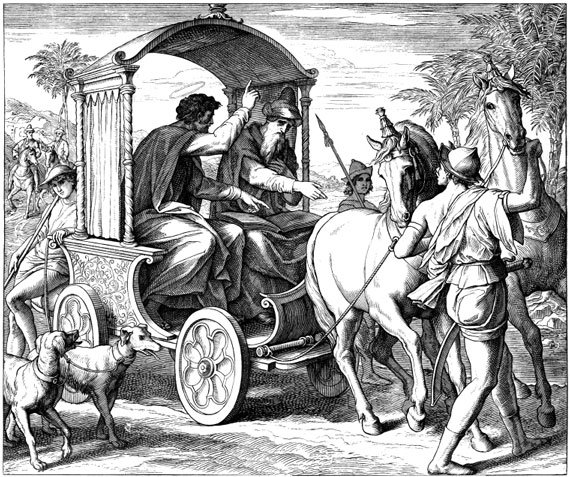Is Acts 8:37 Genuine?
Christian Baptism > John the Baptist • About Us
The Philippian Jailer and His Household
Acts 8:37 • Putting On Christ • Wycherley Critique
"Household Baptism" • GSB Observations
In the Authorized Version (King James Translation) of the Bible, Acts chapter 8, verse 37 reads, "And Philip said, If thou believest with all thine heart, thou mayest. And he answered and said, I believe that Jesus Christ is the Son of God." The Darby translation, in lieu of this verse, contains this footnote: "Verse 37 in the Authorized Version is recognized as not genuine." The Textus Receptus, Geneva Bible, New American Standard Bible, and New King James Version include Acts 8:37, but the New International Version and New Revised Standard Version do not.Some have argued that the verse is not genuine because it is found in only a few late manuscripts and was inserted into the Greek text by Erasmus from the Latin Vulgate. While the passage does appear in Jerome's Latin Vulgate, the passage also appears in many other Old Latin manuscripts. It also is found in the 8th century Greek Codex E and several Greek manuscripts. The precise wording of these texts differs, but the essence of the eunuch's testimony remains. Furthermore, Irenaeus (202 AD), Cyprian (258 AD), Ambrosiaster (4th century), Pacian (392 AD), Ambrose (397 AD), and Augustine (430 AD) all cite Acts 8:37.
For instance, Irenaeus (ca. 125-202) noted that "... the believing eunuch himself: and immediately requesting to be baptized, he said, 'I believe Jesus Christ to be the Son of God'." (Irenaeus, Against Heresies 3.12.8, circa 180 A.D.). Likewise, Cyprian (ca. 200-258) quotes the first part of the verse, writing, "In the Acts of the Apostles: 'Lo, here is water; what is there which hinders me from being baptized?' Then said Philip, 'If thou believest with all thine heart, thou mayest.'" (The Treatises of Cyprian, Treatise 12, Book 3, Section 43). These statements, clearly quotations of Acts 8:37, appear by the end of the second century and at the first half of the third. So the passage was in common use long before the existing Greek manuscripts were copied. This in itself suggests its authenticity.
So if the text is genuine, why would a scribe decide to delete it? Here are two possible explanations. Firstly, by the middle of the third century, Origen of Alexandria had taught the doctrine of infant baptism. Secondly, by the end of the third century it had become common practice to delay the baptism of Christian converts to assure that they really understood their commitment to Christ and were not holding any of the heresies that were current in that era. Perhaps a scribe, believing that infants should be baptised or that baptism should not immediately follow conversion, omitted this passage from the text, which would explain its absence in many of the subsequent Greek manuscripts.
Stephen Hesterman
 Philip conversing with the Ethiopian eunuch (19th century engraving by von Carolsfeld).
Philip conversing with the Ethiopian eunuch (19th century engraving by von Carolsfeld).